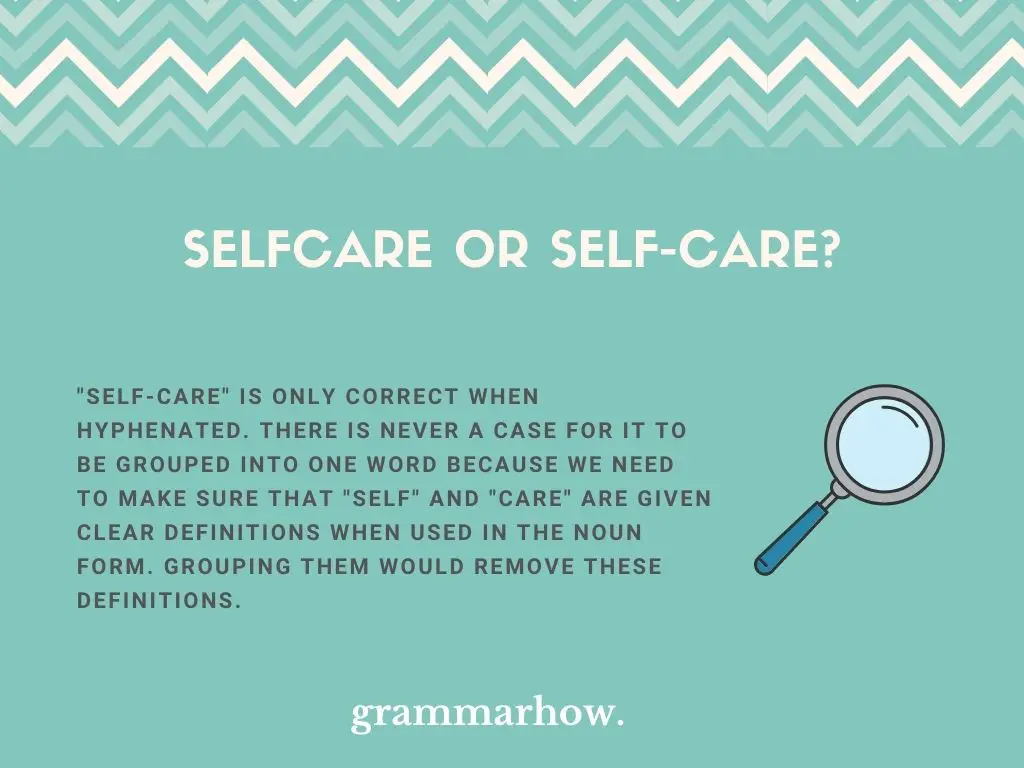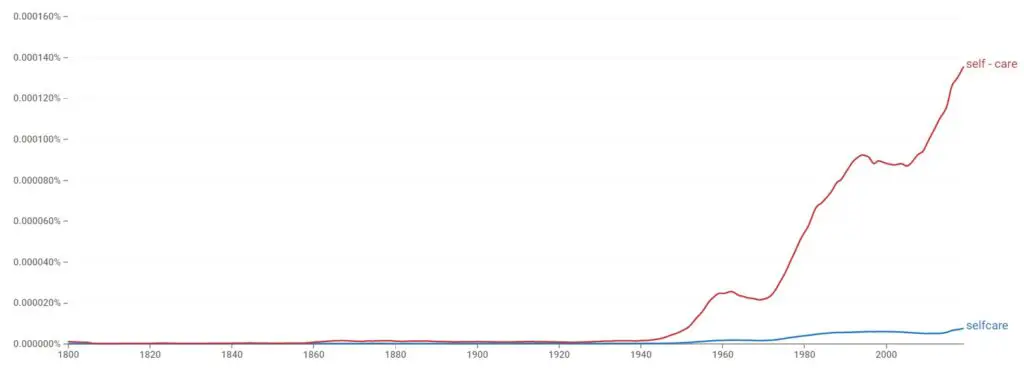Is “self-care” written as one or two words? That’s what we’re going to find out in this article. Some people write it as the hyphenated form, while others seem to split it up. This article will explore the true version and how to use it.
Selfcare vs. Self-care
“Self-care” is only correct when hyphenated. There is never a case for it to be grouped into one word because we need to make sure that “self” and “care” are given clear definitions when used in the noun form. Grouping them would remove these definitions.

According to Google Ngram Viewer, “self-care” is the only acceptable option in any case. It’s vastly more popular than the one-word variation, showing that it’s the one that is grammatically correct and it’s the one you should use in your own writing.

The Cambridge Dictionary and The Oxford Dictionary both define “self-care” in the hyphenated form. This shows that it’s the one you should stick to. They write that it is a noun, and we can use the hyphen rules to treat “self-” as a prefix for the root word “care.”
Neither dictionary notes that “selfcare” should be grouped. However, both dictionaries also make a point to say that “self care” as two separate words is also a valid option in writing. It is synonymous with “self-care,” so it’s up to you how you want to write it.
Selfcare
“Selfcare” never works when it is grouped into one word. Remember, we treat “self-” as a semi-prefix when using it in this way, which is why the hyphen is needed. Since “self” is already a defined word, we must make a clear distinction between it and “care.”
If “self-” was a more common prefix that isn’t a word (think “pro-” or “pre-“), then the story might be different. We might find that “selfcare” as one word is perfectly acceptable.
However, since “self” comes with its own definition, we need to make sure it modifies “care” correctly. That’s why the hyphen is necessary in every case that it’s used.
These examples will clear up any difficulties you might be having with it:
- Correct: Self-care is very important to these services. We want to make sure that everyone will be able to look after themselves.
- Incorrect: I didn’t do very well with the selfcare protocols. I really tried, but I just found them to be too tiresome and boring.
- Correct: I think you should try some self-care before wasting any time or money going to the hospital about something like this.
- Incorrect: Selfcare only works when you’ve done the appropriate research. Don’t try to guess anything on the spot!
Self-care
You should always keep “self-care” in the hyphenated form (or split it into two words in some cases). This works because it allows us to clearly distinguish between “self” and “care” while also ensuring the meaning of the two words interacts with each other correctly.
“Self-care” mostly works as a noun or modifier, so we can refer to AP Stylebook rules to learn how the hyphenation works with it. Whenever a modifier is made of more than one word, AP Style allows us to place a hyphen between them to show the connection.
Without the hyphen, it could be difficult for a reader to figure out what we’re trying to say when using “self care.”
Perhaps you’d like to check these examples out to help you:
- I don’t do much self-care because I know I’m not very good with it! I leave it up to other people.
- Self-care is the best thing I could have done for myself. I’m glad the doctor recommended it to me.
- I love self-care practices! They’re the most fun you can have while also making sure you’re looking after your mind, body, and spirit.
- Self-care trumps private care if you ask me. I’ve always found that I’m better off trying to treat myself.
Is “Care” Capitalized In The Word “Self-Care”?
There is never a reason to capitalize “self-care.” That means that never part of the hyphen form should have a capital letter. The only time you might find it useful to capitalize it is when it starts a sentence or is in a title.
If it is in a title, then you can capitalize both parts of the hyphen. This will allow it to look more in place compared to the rest of your title.

Martin holds a Master’s degree in Finance and International Business. He has six years of experience in professional communication with clients, executives, and colleagues. Furthermore, he has teaching experience from Aarhus University. Martin has been featured as an expert in communication and teaching on Forbes and Shopify. Read more about Martin here.

